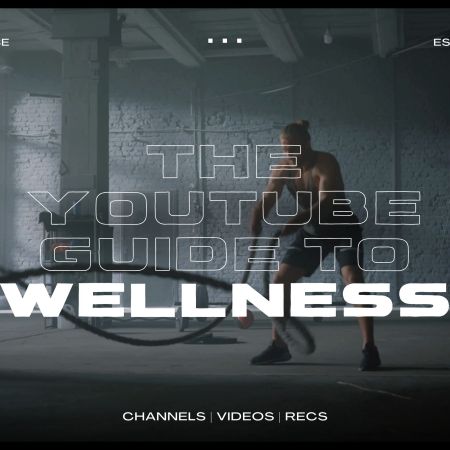Goal-oriented wellness has its moments. When you’re training to make a team, beat a time or radically change an unhealthy lifestyle, numbers and dates are often worth shooting for.
But for too many of us, especially at the beginning of a new year, wellness goals trend too lofty and too specific. You want to weigh something in time for a wedding. Or lift something in time for the summer. You promise to get up every day before work for a new, expensive class. When these goals fall short, we’re wracked with guilt; and for the majority of us, that happens almost immediately — a few years back, Strava identified January 19th as “Quitters’ Day,” the day people are most likely give up on their wellness resolutions.
It’s a self-defeating process, and one that we can’t afford to practice next year. In theory, 2021 should improve mightily on the disaster that was 2020. But the first few months are going to be tough. Gyms remain closed in much of the country, and WFH will persist until at least July. Fitness can help us push through this home stretch (it gave us everything this year), but it should be approached in a tempered, thoughtful way.
To that end: 25 reasonable resolutions for getting fit in 2025. You won’t find gameplans here for maxing out on the bench press or winning a Memorial Day 5K. Each is a worthy pursuit, but there are so many other digestible, actionable, sustainable ways to improve how you move and feel on the day-to-day. From reading before bed to prioritizing nasal breathing to just hanging from a bar once in a while, here are our recommendations.
1. Hang From a Bar for One Minute a Day
In the “text neck” era, a daily dead hang will bring mobility back to your shoulders. The practice decompresses the spine and builds strength in the upper back. Install a bar at your house or go to the local jungle gym.
2. Adopt an Outdoor Activity
Exercise is often most effective when you don’t realize you’re doing it. Instead of “committing” to 100 push-ups a day (and never following through), put aside more time this year for tennis or golf, or try something new like wild swimming or gravel biking.
3. Play
The only thing that’s inherently “childish” about playing is that children are more likely to do it. Playing, in whatever form it may take — shooting hoops, chasing your kids with a super-soaker — is essential for mental health at all ages, and a crucial deviation from exercise measured in pain and progress.
4. Prioritize Recovery
Recovery toys get most of the coverage — and deservedly so. Massage guns, compression sleeves and stainless steel ice balls are all dynamite innovations for addressing “hot spots” and preventing injury around the body. But don’t forget free, soothing everyday options like stretching, meditation, self-massage and even skincare.
5. Take a Daily Constitutional
It’s simply more important than ever. Find 45 minutes in your day where you can get a walk in. Make it non-negotiable. It will lead to sharper, less stressful afternoons, and you’ll pick up an easy 3,000 steps along the way. If you’re way too busy, supplement your week with a “weekend super walk.”
The Gospel of Contrast Bathing
Sauna, ice bath, repeat. Here’s how the wellness world got obsessed with cycling between hot and cold.6. Work Out Without Your Phone
On average, Americans spend a little over an hour each day working out. In the home workout era — with discipline hard to come by — that hour is in even more jeopardy. Protect it by sticking your phone in a drawer before you go sweat. It will yield better, more focused workouts.
7. Join a Run Club
Yes, run clubs played the role of Cupid last year. But their real utility is more practical than romantic. They’re a social outlet, a proven incubator for incremental progress and a perfect way to fall in love with the sport, if not with someone else.
8. Turn the Volume Down
We don’t think too much about ear health, and that’s a huge mistake. Damage done to the ossicles is irreversible. If you wear AirPods, train yourself to listen to them on low volume. Pumping 90-decibel noise (80% of an iPhone’s allotted volume) into your ears for just 10 minutes will put you on the path to tinnitus.
9. Snack Better
This one could be as simple and specific as “eat blueberries and almonds all day long.” But roundly trading in salt and crunch for fruit and nuts is understandably difficult; to that end, get acquainted with our guide to America’s 25 healthiest snack brands, all of which have found to provide flavor without including overly-processed crap.
10. Eat Less Meat
Switching to a plant-based diet can trim your waistline, boost athletic performance, increase your libido and improve your sleep, while those who eat too much red meat are at an increased risk of death from heart disease, stroke and diabetes. Try to cut back next year. Thankfully, it’s easier than ever to pull it off.
From a Wellness Writer: My 5 Unhealthiest Habits This Year
I tried to set myself up for success in 2024. But sometimes I fell short.11. Try Not to Eat Past 8:00
There are a couple ways of looking at this. Try not to eat within two hours of heading to bed, and try not to observe a nighttime snacking ritual, especially if you’ve already eaten a satisfying dinner. The timing isn’t exactly the issue; it’s more about the type of eating we tend to accommodate at this time of day — carb-heavy fare that will impede your body’s ability to burn fat as you sleep.
12. Start Breathing Through Your Nose
When we breath through the nose, the nasal passageway humidifies and pressurizes the air. It produces nitric oxide, a molecule that “screens” air particles before they make it to the lungs. Once there, the lungs have an easier, more efficient time of circulating oxygen throughout the body. This isn’t an easy switch (over half of Americans breath through their mouths) but it’s worth it.
13. Stop Clenching Your Jaw
This was a big year for “bruxism,” also known as teeth grinding or jaw clenching. It’s a natural response to an age of constant anxiety, but it leads to terrible sleep and even tooth fractures. When you’re stressing, take extra care to put space between your teeth and focus on your breathing.
14. Get Yourself a Laptop Stand
We have to sit smarter next year, especially if WFH is going extend into the summer for many employees. The easiest way to protect your back is pick up a laptop stand. Our favorite — Rain Design’s $40 mStand — raises your laptop a crucial six inches, keeping eyes level with the top third of the screen. This will help keep the posterior chain “stacked” (low back, spine, neck and head all vertical, arms locked in at a 90-degree angle).
15. Exercise in the Cold
Cold-temperature exposure can help turn white fat (the inflammatory fat linked to heart disease) into brown fat (the naturally occurring fat that produces heat), though a process called thermogenesis. Your body has to burn more energy to stay warm, which jumpstarts your metabolism. Long walks — or even runs — this winter are your friend.
Short, Sweaty and Sweet: A Guide to Quick Workouts
Workouts under 20 minutes have taken over fitness. We explain why, then offer five to try.16. Take Colder Showers
If that just sounds terrible, try to get your cold fix from the shower. In addition to catalyzing the “cold sculpting” described above, cold-water immersion has been linked to lowered blood pressure, immune system stimulation and happy hormones. Start by turning the knob all the way to cold for the last 30 seconds of your shower.
17. Read Before Bed
Fiction, especially. Reading about the lives of other people (even those who don’t exist) has a tendency to pull us away from our own concerns, while fostering empathy and imagination. It’s a potent tool just before bed, which will probably lead to better dreams.
18. Cut Back on Blue light
Plus, a dedicated reading routine is a great way to reduce screen time. We spend an average of 10 hours a day beaming artificial light directly into our eyeballs. This causes eyestrain, of course, but it also suppresses the secretion of melatonin, a hormone released by the pineal gland that is commonly associated with sleep-wake timing.
19. Head to Sleep Earlier
Use the early days of 2021, when the sun is still setting around 4:30 and you’re still working from the house, to implement an earlier bedtime. It doesn’t have to be dramatic — even just an extra hour a night could positively impact your mood, daily productivity, waistline and risk of disease.
20. Invest in Your Sleep
It’s a third of your life, assuming you’re giving sleep its due. Aside from getting a new mattress, there are a ton of worthwhile products out there for optimizing your nightly sleep.
Your Last, Best Defense Before Sleep Divorce
In which we sing the unheralded praises of the “split king” bed21. Embrace Behavioral Activation
Behavioral activation refers to any positive activity that necessitates presence of mind. Think: cooking, cleaning, gardening. Reclaiming otherwise onerous activities as opportunities to create can fill your brain with a feeling of accomplishment. And if we’ve learned anything this year, mental health is just as important to “getting fit” as the size of your biceps.
22. Dabble in News Sobriety
Kind of a tricky one, as ignoring the news all the time would be a privileged, unrealistic existence. But consider this your permission slip to take breaks from the news cycle, especially when private matters — work, relationships, what have you — have got you down. Occasionally shutting the faucet could give your mental health the boost it needs. At the very least, put a stop to regular doomscrolling in the year ahead.
23. Call a Friend
Calling up an old friend out of the blue is so much more powerful than we give it credit it for. This study shows that when people receive even brief phone calls, their levels of depression, loneliness and anxiety decrease in kind. As you’ll be on the other line, it’s a win-win. There are probably a couple names that come to mind right when you read this. Trust that instinct and give one a ring.
24. Get Better at Kinkeeping
A phrase we learned last year, which refers to all the work that’s done to keep family events and traditions humming along. Men are typically not the best kinkeepers, but you can turn the tide by taking a more active role in your family tree next year. Start “locally” (i.e., in your own home), by creating weekly cooking rituals.
25. Establish a Third Place
Home’s the first place. Work’s the second. Do you have a third? If not, look to find and foster one in 2025. It can be a bistro, a bar, a gym, an art center, a racquet club. Any place where you can grow to consider yourself a “regular,” where you’re free to gather and interact with others in informal ways. Having a third place makes a real difference, trust us.
Whether you’re looking to get into shape, or just get out of a funk, The Charge has got you covered. Sign up for our new wellness newsletter today.





























